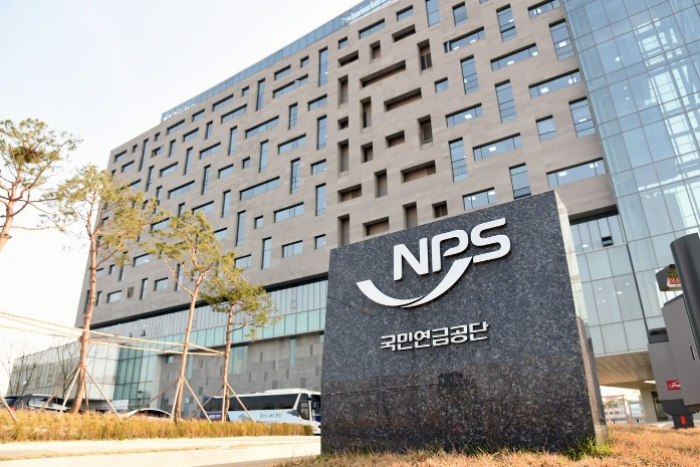Pension funds
NPS lags global peers in 2013-2022 investment returns
The Korean pension fund saw 4.99% average annual return; needs greater efficiency for decision-making and investment execution
By Feb 05, 2023 (Gmt+09:00)
3
Min read
Most Read
LG Chem to sell water filter business to Glenwood PE for $692 million


Kyobo Life poised to buy Japan’s SBI Group-owned savings bank


KT&G eyes overseas M&A after rejecting activist fund's offer


StockX in merger talks with Naver’s online reseller Kream


Mirae Asset to be named Korea Post’s core real estate fund operator



South Korea's National Pension Service (NPS), the world's third-largest pension fund, has underperformed its global peers over the past decade in terms of rate of return, The Korea Economic Daily found.
Market watchers advise that the pension fund should eye financial performance rather than get involved in political conflicts, which leads to asset management inefficiency.
NPS' fund management arm achieved an average 4.99% annual return for the 10 years until end-2022, compared with 9.58% by the Canada Pension Plan Investment Board (CPPIB), 7.12% by the California Public Employees' Retirement System (CalPERS), 6.80% by Norges Bank Investment Management (NBIM), 5.64% by the Netherlands' ABP and 5.30% by Japan’s Government Pension Investment Fund (GPIF), according to data from Global SWF.
Under the current asset management system, the NPS fund will hit 1.76 quadrillion won in 2040 and is set to be depleted by 2055, according to the financial estimation committee. The fund’s life can be extended by eight years if the annual rate of return increases by 100 basis points, analysts say.
But the current structure of NPS' asset management is inefficient for profitability. Its asset management committee, the highest decision-making body in the fund's operation, has only a few financial experts among its 20 members.
INFLUENCED BY POLITICAL BIAS
The committee, chaired by the health and welfare minister, has been criticized for reflecting the government's political bias.
The fund management headquarters relocated to Jeonju, 200 kilometers south of Seoul, in 2015 for the country's regional growth strategy. The fund's efforts to strengthen stewardship and shareholder activism are also regarded as a tool to serve the government's political agenda.
The government is discussing how to improve the pension fund’s asset management efficiency.
One potential strategy is to exclude three ex officio members, who are government executives, from the fund management committee. Another is to increase the number of financial professionals on the committee to enhance investment expertise.
However, experts see that the potential plans could be canceled. The government considered a similar plan in 2019 -- reducing the number of government officials on the fund management committee from six to three for structural reform -- but has since dropped the plan.
The government has also begun discussing whether to separate the fund management arm from NPS and upgrade it as a state-run company in 2004. However, some politicians have objected to the plan as it included locating the company in Seoul, which seemed to hurt the balanced regional growth strategy.
SLOW DECISION-MAKING WITH LACK OF FINANCIAL EXPERTISE
The fund management’s decision-making structure needs to focus more on financial performance, experts say.
“It takes years to convince the fund management committee, most of whom don't have expertise in finance, to add an alternative asset class to the portfolio. Such practices slow its investment execution while other global pension funds are nimble in the market,” said a former NPS source.
The pension fund is intensifying its shareholder activism against some major companies in Korea. Last December, NPS expressed disagreement with telecom giant KT Corp.'s decision to tap its current CEO Ku Hyeon-mo as the sole candidate to become its next chief, citing that such practices are not transparent nor fair.
The statement pointed to the Yoon Suk-yeol administration's intent to replace CEOs, including Ku, who were hired during the last regime and were close to former President Moon Jae-in.
“NPS can demand improvement of corporate governance as a shareholder, but its shareholder activism reflects political objectives. The pension fund urgently needs independence from the government to more focus on profitability, flexibility and a fast decision-making process,” said another pension fund source.
Write to Byeong-Hwa Ryu and Jung-hwan Hwang at hwahwa@hankyung.com
Jihyun Kim edited this article.
More to Read
-
 Pension fundsNPS underperforms global peers by returns for Q1-Q3 2022
Pension fundsNPS underperforms global peers by returns for Q1-Q3 2022Jan 31, 2023 (Gmt+09:00)
2 Min read -
 Pension fundsKorea’s NPS to be in red in 2022 with 5.3% loss in Jan-Oct
Pension fundsKorea’s NPS to be in red in 2022 with 5.3% loss in Jan-OctJan 01, 2023 (Gmt+09:00)
2 Min read -

-
 Pension fundsNPS will intensify shareholder engagement, new CIO says
Pension fundsNPS will intensify shareholder engagement, new CIO saysDec 27, 2022 (Gmt+09:00)
2 Min read -
 Pension fundsNPS fund management taps former GEPS CIO Seo as new chief
Pension fundsNPS fund management taps former GEPS CIO Seo as new chiefDec 27, 2022 (Gmt+09:00)
1 Min read
Comment 0
LOG IN


